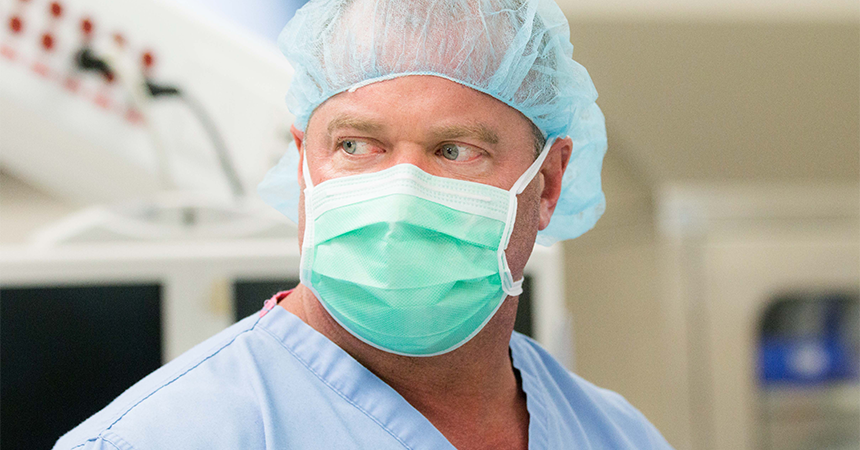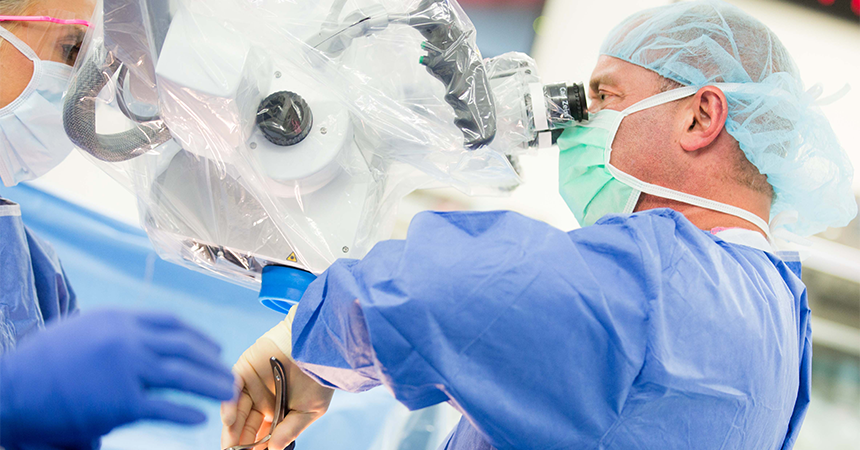At HSC, experts search for cures to ‘most aggressive form of brain cancer’
Malignant brain tumors, known as glioblastoma multiforme, spread aggressively and are described as incurable.
The five-year survival rate for people diagnosed with this cancer – also known as GBM – is only 6.8 % and the average length of survival for people with GBM is about 12 to 18 months, according to the National Brain Tumor Society (NBTS).
Experts at The University of North Texas Health Science Center at Fort Worth (HSC), are working to find therapies to change the grim outlook for patients with GBM.
“We are studying the most aggressive form of brain cancer which is terminal,” said Dr. Rob Dickerman, a neurosurgeon and a 1998 graduate of the Texas College of Osteopathic Medicine (TCOM).
Dr. Dickerman, who operates the Plano-based North Texas Spine and Brain Institute, is helping with his time and donations. His pledges total $125,000 and aim to boost the research of Dr. Andras Lacko, PhD, a professor of physiology and anatomy at the Graduate School of Biomedical Sciences.
“I feel, in my heart, for patients diagnosed with GBM and just believe in Dr. Lacko’s abilities and what we have going,” Dr. Dickerman said.
In 2015, Dr. Dickerman established the Peggy Dickerman Brain Cancer Research Fund, named after his late mother, at HSC to explore novel treatments for glioblastoma. Dr. Dickerman has been working on this research project with Dr. Lacko, PhD, and Dr. McConathy, PhD, who has retired.
Dr. Lacko is an expert in apolipoproteins and nanoparticle drug delivery.
“This is a technique he has utilized on other cancers with good success,” Dr. Dickerman said. “We, as a lab, published a manuscript last year showing promise with this therapy in brain cancer. My donations are to keep this promising research going.”
Dr. Lacko’s research centers on a drug delivery system that could improve cancer chemotherapy. The delivery system would rely on drug-carrying synthetic “good” cholesterol nanoparticles that target cancer cells and bypass most normal cells, sparing the patient the harmful side effects of chemotherapy.
Dr. Dickerman’s connection with Dr. Lacko is one of mentorship and friendship. Dr. Lacko served on Dr. Dickerman’s PhD committee from 1992-1998 with Dr. McConathy, a biochemist and former director of HSC’s Division of Clinical Research.
Fighting brain cancer is a mission.
“As a neurosurgeon, there is a level of responsibility to your patients – to give them your best. I know there is an answer to treating this cancer and it is in research,” Dr. Dickerman said. “For now, I do my best as a surgeon to safely resect the cancer and partner with the oncologists and radiation oncologists to treat patients.”
Dr. Dickerman said philanthropic investment in HSC’s work could ultimately save lives.
“Shouldn’t we all do what we can for the less fortunate and in this case the terminal,” Dr. Dickerman said. “If people realized how aggressive and destructive this cancer is, they would see the nightmare it presents for patients and families, and I would hope do whatever they can to stop it.”
That is a message that will be echoed by allies of people with GBM during Brain Tumor Awareness Month in May. Nationwide, advocates are asking that communities learn more about brain tumors, including GBM. Well-known figures who have died of this form of cancer include former U.S. Senators John McCain and Edward “Ted” Kennedy. In 2015, President Joe Biden’s son, Beau Biden, died after battling this form of cancer.
Anyone interested in supporting HSC’s research, can do so through the Peggy Dickerman Brain Cancer Research Fund on the HSC giving page https://unthscstaging.wpengine.com/give/give-now/.








Social media